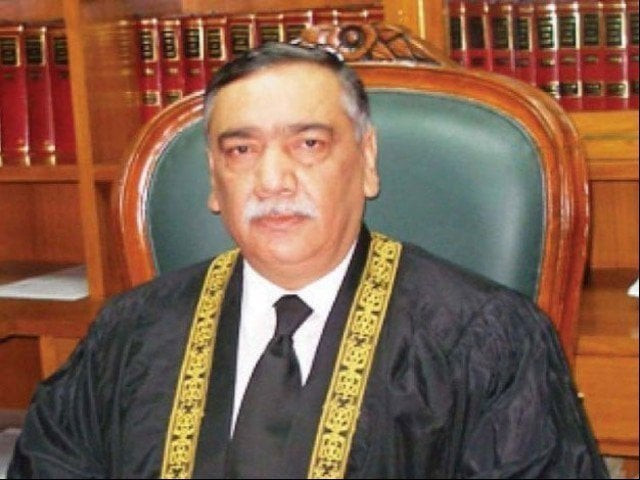Economic crisis, chaos in NA give CJP the blues
Justice Khosa says there's depressing news all around, only justice sector doing well

Chief Justice of Pakistan Asif Saeed Khosa PHOTO: FILE
"Unfortunately, there's no good news these days. We're told that it [economy] is in the ICU or just coming out of it. There's only depressing news," the country's top judge said while addressing a session on 'Orientation on Expeditious Justice Initiative for Judges of Additional Model Criminal Trial Courts' at the Federal Judicial Academy.
"We also can't take pride in our democracy. When we turn on the TV, we see that there's noise in the parliament and both the leader of house [the prime minister] and the leader of the opposition are not being allowed to speak and that depresses us," he observed.
"There's also nothing to cheer about when it comes to sports and in the region there are problems in Afghanistan and war clouds looming over Iran."
The chief justice said there was only one sector in the society that was doing well and that was justice.
"The only good news is coming from the justice sector where 5,800 criminal trials have been concluded within 45 days," he noted.
Shedding light on the establishment of the model criminal trial courts (MCTCs), the CJP said: "Knowing the gravity of criminal cases and pains and pathos of justice-seekers, we prioritised the creation of MCTCs. The results of these courts are incredible."
He added that with the cooperation of all stakeholders of the administration of criminal justice system, miraculous things had happened.
"From now onwards we will be adding one more judge to every district every month and the day is not far when we will have every court as a model court in the country. "
Regarding testimony of witnesses, the CJP said: "The judiciary will not tolerate delay and falsehood."
Quoting the famous Latin phrase, "Falsus in uno, falsus in omnibus (False in one thing, false in everything]", Justice Khosa highlighted the importance of veracity in testimony.
The CJP said in its next meeting, the National Judicial (Policymaking) Committee, of which all chief justices of high courts were members, would decide setting up model civil trial courts and model trial magistrate courts.
"We are planning to set up 116 gender-based violence courts and also child courts in every district of the country. These courts will be designed to look entirely different both in their infrastructure and working than other courts," he added.
On the occasion, the chief justice also shared his mission and vision about the establishment of the State of the Art Research Center in the Supreme Court and its utility for judges and others related to the justice sector.
"The research centre has already been established in the Supreme Court. Two Judges of the Supreme Court and seven research assistants will be going for training to the US. The research centre is linked with world renowned research engines. With the effective functioning of the centre, the desired research material will be a click of a button away," he said.
Enlightening the audience about the effective application of technology in the expeditious dispensation of justice, the CJP also spoke about the importance and scope of artificial intelligence.
"Effective application of artificial intelligence will go a long way to bring quality and consistency in the decisions of the judges," he remarked.
He said the Supreme Court of Pakistan had become the first e-apex court in the world which had started hearing online cases.
"We started hearing cases from Karachi and will soon develop the facility in Quetta too," he added.
Justice Khosa further said special benches in high courts had been set up to hear cases related to revenue, banking and other fiscal matters.



















COMMENTS
Comments are moderated and generally will be posted if they are on-topic and not abusive.
For more information, please see our Comments FAQ